Air humidifiers and fragrance diffusers can be great for our well-being. The fragrances can help us relax and reduce anxiety while increasing the moisture in the air can help us breathe more easily. But what about our furry friends?
Could they benefit from a humidifier in the home? Are there any benefits to using a humidifier around your cat? And what should we be careful of to keep our furry family members safe?
What Are the Potential Benefits of Humidifiers to Your Cat?
In humans, dry air can irritate a cough and cause difficulty breathing, which is the same in cats. Let’s find out how a humidifier might help your cat.
Allergies
Respiratory allergies, like feline asthma, can cause your cat to cough regularly. Allergies can also cause your cat’s breathing to become faster and more labored. Feline asthma attacks can be triggered by allergies, including pollen, house dust mites, storage mites, or even home cleaning products.
Using an unscented, plain water humidifier can make the air less dry. This can help to reduce your cat’s coughing by lubricating the airways. It can also help your cat breathe more easily.
Also Read: Best Air Purifiers For Pet Hair, Dander, Allergies And Odor
Cat Flu
Symptoms of upper respiratory infections like cat flu can be improved by increasing the humidity in the environment. Cat flu is caused by multiple viruses and bacteria, including feline herpesvirus, calicivirus, and Bordatella.
Although upper respiratory infections can be prevented by vaccination, it’s common for kittens to become infected while they’re young. Unfortunately, once a cat or kitten has had one bout of cat flu, they often continue to show signs periodically throughout their lives, especially at times of stress.
Cat flu symptoms include discharge from the eyes and nose, and the sheer volume of nasal discharge can make it hard for your cat to breathe. Humidifiers and nebulizers can really help to loosen the mucus in their upper airways, making breathing easier.
Also Read: Heavy Breathing Cat – The 3 Types Of Heavy Breathing And What They Mean
Dry Skin
If your cat is prone to dry or irritated skin, they might benefit from higher humidity. However, if you’re concerned about your cat’s skin you should ask your vet to check for an underlying cause before using a humidifier.
Also Read: Common Skin Problems In Cats: Causes and Treatments
What Are the Risks of Humidifiers to Your Cat?
For their safety, cats should not be allowed to come in close contact with a humidifier’s mechanisms.
So, humidifiers sound like a great idea, don’t they? But are there any downsides? Well, yes. In fact, there are a lot of reasons why you should be very careful when using a humidifier around your cat or any other pet. Here are some of the risks of using humidifiers near your furry friend:
Burns and Scalds
There are many types of humidifier, including warm mist, cool mist, ultrasonic, and evaporative humidifiers. The type of humidifier you choose is very important. Not all devices are pet safe because warm mist humidifiers use a heating system to boil water to create steam or mist.
You should ensure that the humidifier you use doesn’t form a mist from boiling water. Otherwise, your curious cat might be attracted by the vibrations, get a bit too close and end up with a nasty burn injury. Even a cool mist humidifier or an ultrasonic humidifier should be kept out of your cat’s reach to avoid accidents.
Mold
Increasing the humidity levels in your home might make it easier for the furry and non-furry occupants to breathe. Still, in the long term, high moisture levels could lead to a dampness problem and mold. The spores from mold in your home could cause irritation or infection in your airways, the lungs of your cat, or other pets.
Therefore, it’s best to monitor the humidity in your home and keep a close eye for signs of dampness, mold, or mildew. You should also clean all parts of your humidifier at the recommended interval according to the manufacturer’s instructions.
Also Read: Cat Eye Infections: Causes, Symptoms, & Treatment
Bacterial Growth
A warm, damp environment isn’t just a perfect place for mold; it’s also a breeding ground for bacteria. This means that bacteria could thrive within the humidifier or diffuser and in the air in your home.
When you or your pets breathe these bacteria in, you could develop respiratory infections or pneumonia. For this reason, it’s essential to clean and disinfect your humidifier regularly using a pet-safe method approved by the manufacturer.
Essential Oils and Fragrances
You should never use a humidifier or diffuser that uses essential oils. This is because many essential oils are toxic to cats. However, even essential oils and other pet-safe fragrances can irritate your pet’s airway.
This could mean making your cat’s condition worse rather than better. Instead, use distilled water rather than tap water to avoid releasing excess minerals into your home.
Also Read: CBD Oil for Cats: What it is & How to Use It
Considerations When Choosing a Humidifier for Your Cat
When selecting a humidifier for your cat, several essential considerations should guide your decision. First and foremost, consider the size of the humidifier. Opt for an appropriately sized unit that can effectively humidify the room or area where your cat spends most of its time.
Choose a humidifier type that aligns with your cat’s needs and your preferences, whether it’s a cool mist, warm mist, or ultrasonic humidifier. Ease of maintenance is crucial, as regular cleaning and water changes are essential to prevent mold and bacteria growth, so look for models with user-friendly cleaning features.
Take into account noise levels, as overly noisy units may disturb your cat’s peace and comfort.
Frequently Asked Questions
Will a humidifier help my cat breathe?
A fragrance-free humidifier may help your cat breathe more easily if they have allergies, respiratory infections, or other health conditions affecting the airway. However, you should ensure they are kept out of your cat's reach and choose one that doesn’t risk burning or scolding.
Are scented humidifiers safe for cats?
Many essential oils are toxic to cats, so scented humidifiers are rarely safe. Even the essential oils and other fragrances that aren't toxic could still irritate your sensitive kitty's airways, so it's best to steer clear.
How can I help my cat breathe better at home?
If you want to help your cat breathe more easily at home, try bringing them into the bathroom while you have a hot shower. You can even leave them in the bathroom for a few minutes afterward so that the warm, humid air has a chance to clear their congestion.
Investing in a safe nebulizer or vaporizer is another option. You should also try to avoid using a fan in the home, since this can circulate dry air and allergens, causing your cat more airway irritation.
Is a Humidifier a good idea for sick cat
A humidifier can be helpful for a sick cat, particularly if the illness involves respiratory issues or dry air exacerbates their condition.
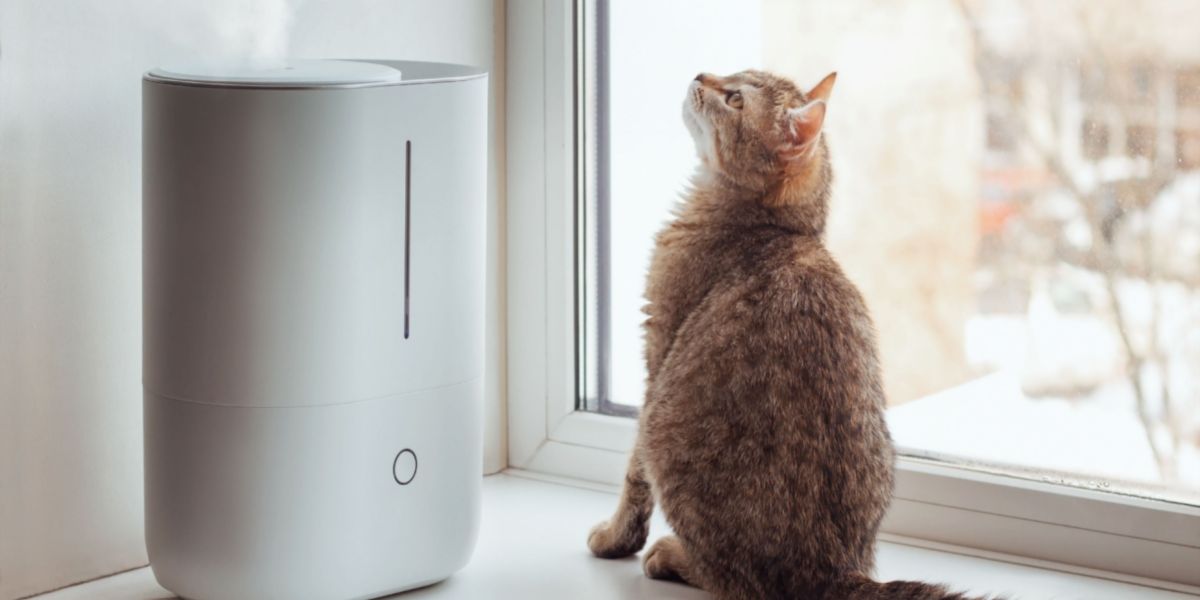
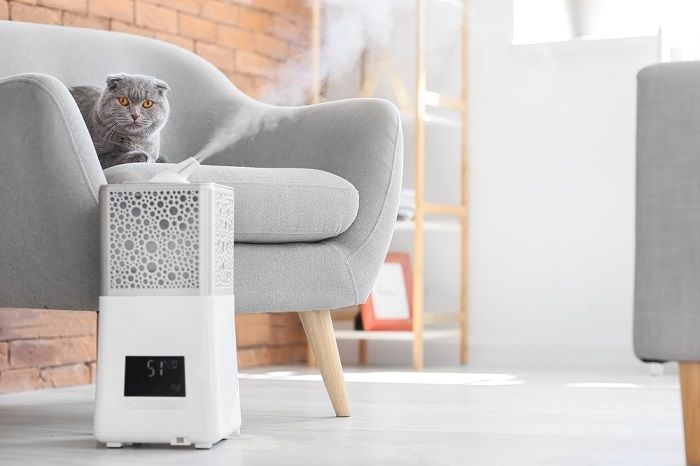
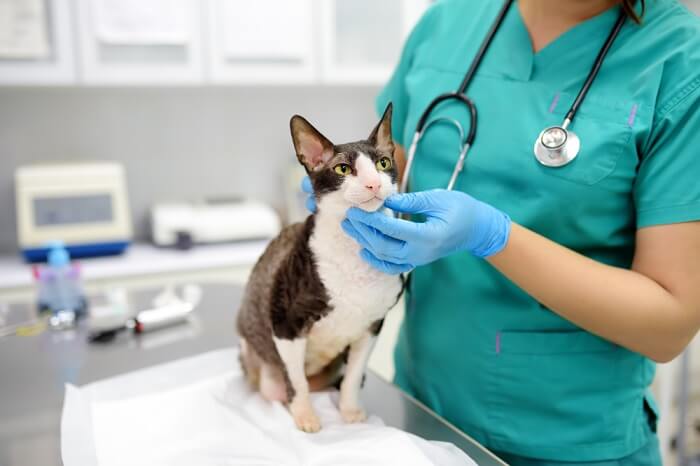

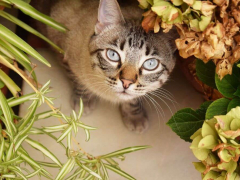

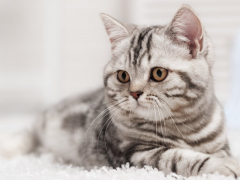
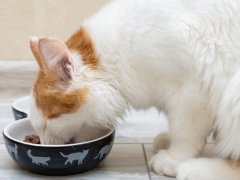
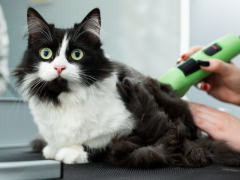

Great article. Concerned about our cat who has symptoms of feline herpes that seems to have worsened during a recent move to a new apartment. He’s on L-lysine but we are interested in a pet-safe humidifier also. Do you have any recommendations for such humidifiers?
Heya! I would recommend anything besides a warm mist humidifier, and any humidifier that works for you should be just fine for your cat—just skip the essential oils and put it in a place where your cat won’t touch it.
Hi! my 15 year old female siamese cat experienced some sneezing problems for a month or more . She was seen by her vet and even cleaned her teeth , checked everything and the vet said she’s totally fine . But the sneezing keep coming back , then we’ve tried using humidifier 2 days ago with only distilled water , . and after a day of using it. I did not hear any more sneezing maybe just once that day and today is the day 3 , so far . Can I still continue to use the humidifier with that distilled water ? and how many times more for the day or the next day ? or
until the sneezing will be gone totally . please advise . thanks so much . I would appreciate your immediate reply .
Hi there! Using the humidifier is just one of the things you can use to treat sneezing and congestion. I would recommend reading this guide for more home treatment tips.